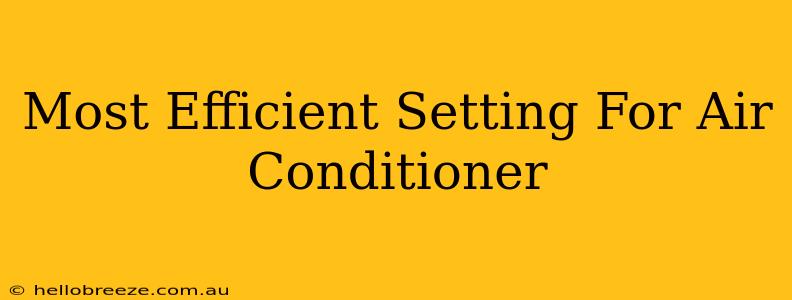Summer's heat can be brutal, and your air conditioner is your best friend during those scorching days. But are you using it as efficiently as possible? Running your AC at full blast all day isn't just uncomfortable; it's a huge drain on your energy bill. This guide will explore the most efficient settings for your air conditioner, helping you stay cool and save money.
Understanding Your AC's Settings
Before diving into the optimal settings, let's understand the key controls on most air conditioners:
- Thermostat: This is the heart of your system, controlling the desired temperature.
- Fan Speed: Most units offer settings like "Auto," "Low," "Medium," and "High."
- Cool/Heat/Auto: This selector dictates the mode of operation.
- Energy Saving Mode (or Eco Mode): This setting often reduces energy consumption by slightly increasing the temperature or adjusting the compressor's operation.
Finding the Sweet Spot: Optimal AC Settings for Efficiency
The goal is to maintain a comfortable temperature without overworking your AC. Here's how to achieve that:
1. Setting the Right Temperature
The ideal temperature setting depends on personal preference, but 78°F (26°C) is often recommended as a starting point for most people during the day when they are home. Raising the thermostat by just a few degrees can significantly reduce energy consumption. When you're away from home or asleep, consider setting the temperature even higher (up to 85°F (29°C) or your comfort level).
2. Utilizing the Fan Setting
The "Auto" fan setting is generally the most energy-efficient. It only runs the fan when the compressor is actively cooling, minimizing unnecessary energy use. Avoid constantly running the fan on "High" unless absolutely necessary.
3. Smart Thermostats: A Game Changer
Investing in a smart thermostat offers unparalleled control and energy savings. These devices learn your preferences, automatically adjust settings based on your schedule, and can even integrate with other smart home devices. Many smart thermostats offer features like geofencing, which automatically adjusts the temperature based on your location. This is a fantastic way to prevent wasting energy when you're away from home.
4. Regular Maintenance is Key
A well-maintained AC unit is a more efficient AC unit. Regular maintenance, including changing air filters and scheduling professional servicing, is crucial for optimal performance. A clogged filter restricts airflow, forcing your AC to work harder and consume more energy. Remember to consult your user manual for recommended filter replacement schedules.
5. Consider Your Home's Insulation and Sealing
Improving your home's insulation and sealing can dramatically reduce energy loss and make your AC far more efficient. Sealing air leaks around windows and doors, and adding insulation to your walls and attic, will prevent cool air from escaping and hot air from entering.
Beyond Settings: Additional Tips for Energy Efficiency
- Use blinds and curtains: Blocking direct sunlight prevents heat from entering your home, reducing the strain on your AC.
- Run energy-efficient appliances: Newer appliances are often much more efficient than older models.
- Use fans: Ceiling fans or portable fans can significantly help circulate cool air and reduce your reliance on the AC.
- Cook outside: Using your oven or stove generates significant heat, increasing your AC's workload.
By implementing these strategies and adjusting your air conditioner's settings appropriately, you can enjoy a comfortably cool home without breaking the bank. Remember, small changes can add up to significant long-term energy savings and a more sustainable lifestyle.

